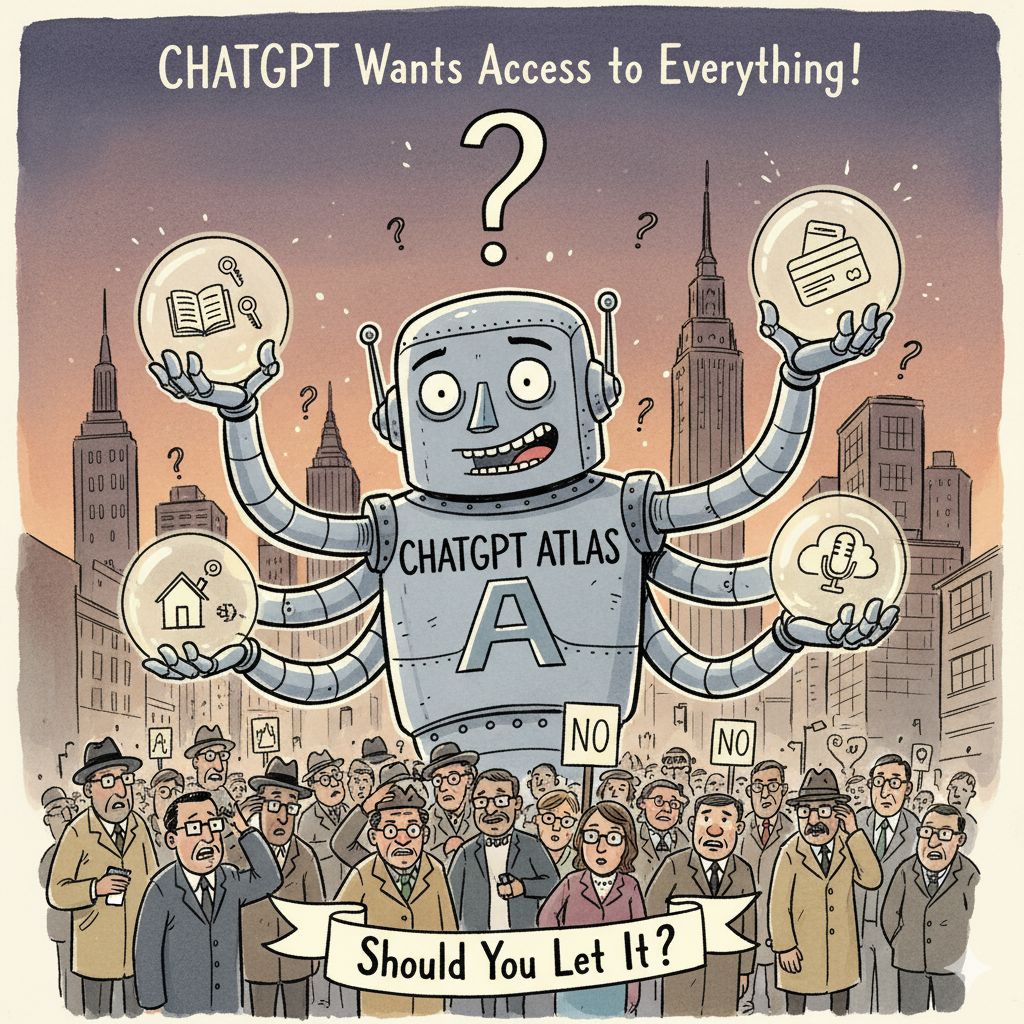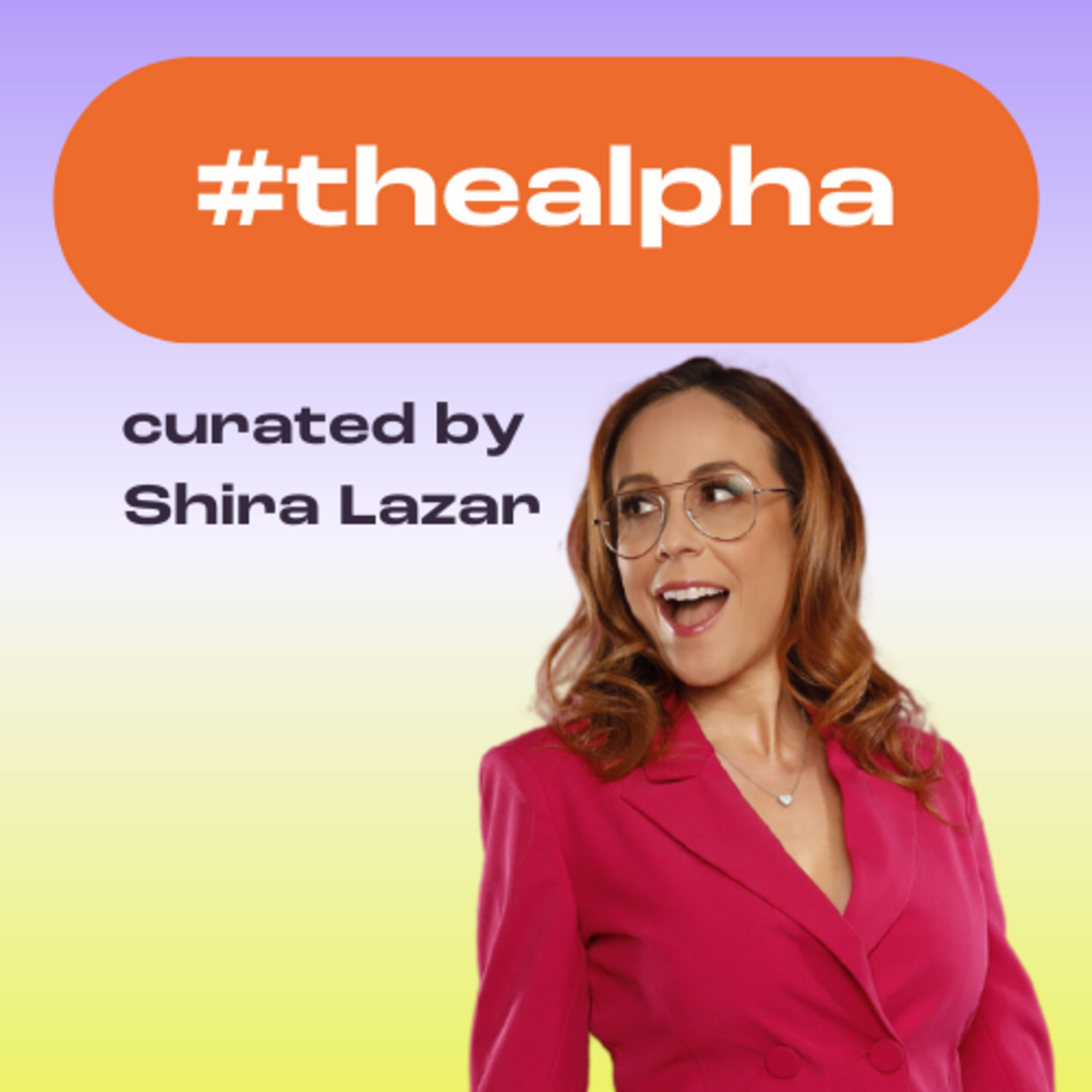
A few days ago, OpenAI pulled the curtain back on ChatGPT Atlas, a full-blown browser built around the formerly humble ChatGPT chat interface.
As a creator and media observer, my first reaction was a mix of “wow, this is a game changer” AND “yikes, this is a game changer.” Because this isn’t just a new app. It’s a power shift, from the open web we browse to the AI that browses for us.
The Shift: From Search to Summaries
Atlas turns the traditional browser inside out.
Instead of opening Chrome or Safari, juggling tabs and chat windows, everything happens in one place. You can ask it to summarize pages, analyze text, and even remember what you’ve researched, if you let it.
For creators, journalists, and entrepreneurs, that’s seductive. You can research, pull quotes, and synthesize insights without ever leaving the page. Your workflow becomes faster, more focused, and eerily efficient.
But efficiency always comes with a trade-off: exposure.
OpenAI’s own Chief Security Officer has admitted that “agentic browsers”, ones that can see your tabs, credentials, and login, open a new frontier of risk. Malicious prompts could trick the AI into revealing sensitive data. In short: you give the AI access to your digital world, and someone else could hijack it.
The Power Shift No One’s Talking About
For anyone who makes a living through attention, creators, publishers, media brands, this moment feels a lot like déjà vu.
We’ve seen this before:
The browser wars of the early 2000s decided who owned the window to the web.
The algorithm wars of the 2010s decided who owned distribution.
Now, the AI browser wars will decide who owns discovery itself.
When a single company controls not just the browser but the conversation, everything changes. If your story, video, or article gets summarized inside Atlas instead of clicked, that’s not just lost traffic and revenue, it’s lost visibility, context, and potentially, trust.
The Compliance Layer: Risk Meets Regulation
Cybersecurity experts are also ringing alarm bells about ChatGPT Atlas. Fortune’s in-depth report called the browser “vulnerable to attacks that could turn it against a user, revealing sensitive data, downloading malware, or worse.”
But from a compliance and media-business angle, the risks aren’t just technical, they’re structural.
When a single company controls the gateway through which users access the web, it shifts the discovery landscape entirely. Traditional models built on website traffic, referral links, and ad revenue are suddenly at risk. Publishers now face both a security risk and a platform risk.
At the same time, compliance experts are asking bigger governance questions:
Who controls data sovereignty in an AI-mediated browser?
How do we track consent and traceability of actions when the “user” is partially an agent?
What happens to regulatory oversight when a browser can make decisions on your behalf?
Legal analysts at White & Case note that AI-powered browsers “will force new frameworks around consent, data lineage, and cross-border governance.” In other words: the compliance challenges aren’t just about protecting data, they’re about redefining digital accountability itself.
The New Browser Wars
OpenAI says users can choose what Atlas remembers or forgets, but the lines between convenience and overexposure are already blurry. The guardrails are more behavioral than they are technical.
If you map this to the early internet, we’re reliving a familiar story: Internet Explorer’s monopoly, Firefox’s rebellion, Chrome’s dominance. Only now, the battlefield isn’t tabs, it’s agents, memory, and automation.
Competitors like Perplexity AI’s Comet are racing to launch their own versions. Whoever wins this new “AI Browser War” could own not just web access, but how we experience knowledge online.
What This Means for Creators and Media Professionals
If you make content, this isn’t a distant concern, it’s a new literacy test.
Atlas is where creation, consumption, and curation collapse into one interface.
That means:
You’ll need to track not just where your content lives, but how it’s interpreted by AI.
Your brand voice might be summarized or paraphrased before anyone even clicks through.
And your audience relationships, built on visibility and trust, will depend on how discoverable you are inside these AI ecosystems.
In fact, I recently wrote about this in my newsletter on the transition from SEO to AEO (Answer Engine Optimization), where I explored what happens when search results become answers instead of gateways, and how I’m preparing for it with my site, What’s Trending. This is that same idea, now baked into your browser.
I also unpacked this shift on an episode of my podcast, The AI Download with Jim Marsh, where we discussed how the next wave of AI tools is reshaping attention, ownership, and creative independence.
My Hot Take: ChatGPT Atlas is shiny and powerful, and it might just be the future of how we work online. But the same browser helping you research, write, and edit could also decide whether your audience ever finds you at all.
So experiment, but stay aware.
Keep your credentials tight. Keep your transparency high. And above all, own your relationship with your audience. The next era of digital literacy isn’t just about learning new tools, it’s about protecting what you’ve built while the tools evolve around you.
3 Things to Do Right Now
Test your visibility: Ask ChatGPT or Perplexity what it knows about your brand. How accurate is it?
Separate your workflows: Don’t mix logins and AI research, the “smart” browser still learns from everything you do.
Double down on direct channels: Your newsletter, podcast, and community are the only feeds the AI can’t rewrite.
If you’re experimenting with AI tools, check out the SAIL Worksheet I built with Jim Marsh, a framework for building your own custom GPT that stays grounded, intentional, and human.
Other headlines to check out:
AI
Creator Economy
Web3
Find me at: Creators 4 Mental Health Atlanta!

I’m so excited to be bringing Creators 4 Mental Health to Atlanta alongside creator, Jayde Powell, Influential and incredible our sponsor SAG-AFTRA!
The ATL Creator Check-In is a feel-good gathering centered on real-world wellness and mental health for creators. We’ll explore practical strategies for protecting your peace, navigating burnout, and building sustainable creative careers without losing the joy that brought you here.
Come connect with fellow creators, enjoy guided meditation, mocktails, and an honest conversation about boundaries, balance, money, and meaning.
🗓️ When: Tuesday, November 4 - 6:00 PM - 9:00 PM EST
📍 Where: Atlanta, GA
🔗 RSVP: luma.com/zok71quk
Gentle Reminder 🙏
Success is the ability to go from failure to failure without losing your enthusiasm.
Advertise with me :)
Remember, I'm Bullish on you! With gratitude,


